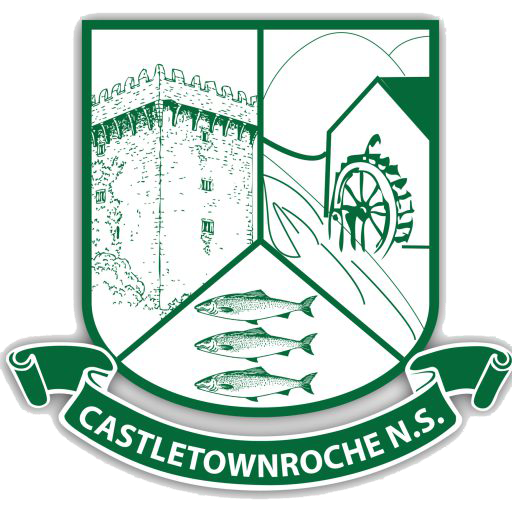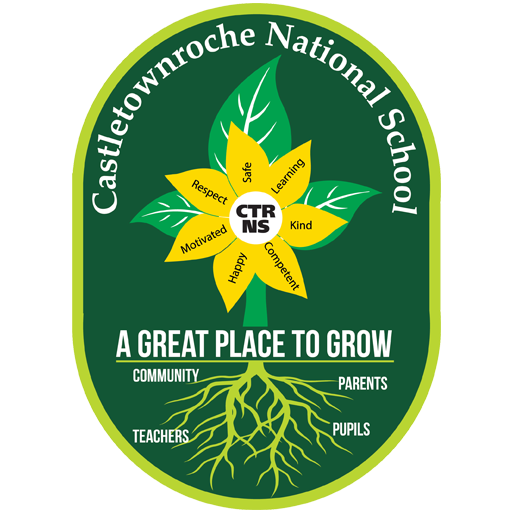Homework
The Benefits of Homework (from www.schooldays.ie)
Homework will tend have a specific purpose and will be given consistently, in small quantities. It is extremely useful for a number of reasons:
- It acts as a form of communication between school and home
- It allows you to see how your child is progressing in different areas
- It helps to develop the child’s self-discipline
- It helps a child to become an independent learner
- It is helpful to revise or reinforce work done in school
- It may be used to finish work that was begun in school

Guidelines on a Class by Class Basis

Juniors & Seniors:
For this age group, the recommended time to be spent on homework is 15-20 mins | Dictation: Each class group receives one list of words sourced from the Jolly Phonics programme each week. The parents will call out three words per night for their child to write into their copies. At the end of the week, the Junior Infants re-read their words from the week and senior infants put their words into sentences. Blending: Both class groups are assigned sight words each week for homework. Currently, the Junior Infants are working off the Dolch list and Senior Infants are working off their Jolly Phonics Book 2 sight word lists. Readers: Both class groups are assigned suitable texts according to the student’s ability. The Junior Infants receive decodable sentences and readers each week. Senior Infants receive one levelled text to be completed weekly. Both sets of readers are changed weekly. Phonics: Both class groups revise their letter sounds of the week using Just Phonics A (JI), Just Phonics B (SI) and Jolly Phonics Books one and two. Writing: Both class groups practice their letter formation of their sound of the week using the Just Handwriting programmes. Senior Infants have now started writing independent three line stories based on an assigned picture from their Jolly Phonics Book 2. Oral language: Oral language tasks including audio stories/ poems/ songs and rhymes are assigned for homework at the beginning of the week. |
1st & 2nd Class For this age group, the recommended time to be spent on homework is 20 – 30 minutes. | Spellings SpellWell 1 (First Class) & SpellWell 2 (Second Class) – each class is advised to learn 4 spellings per night and revise all spellings on a Thursday. A strategies sheet was given to each child in September outlining useful strategies and ideas to help children learn their spellings. Some of these strategies include “cover and write” and write a sentence including the focus word. A spelling check takes place every Friday. Read at Home Read at Home 1 (First Class) & Read at Home 2 (Second Class). Each class is asked to complete one page of the book per night. Children should read the story twice (with the help of their parents/guardians) before answering the 5 questions into their homework copies. In September, First Class are allowed to write one word answers but as they gain confidence and competence they should focus on writing full sentences (capital letters & full stops). Dolch Word lists / Sight Word Lists In term one, children in First Class are given differentiated word lists. Parents are given a corresponding sheet outlining fun games and activities that are recommended to be done with their children to help them learn the focus words. Word lists are allocated according to each child’s level. Padlet I have created a padlet account that each child has access to. It is recommended that children pick from a list of activities once or twice a week. Reading for Pleasure Children are encouraged to read to their parents and parents are encouraged to read to their children. The aim is to instill a love for reading. |
3rd & 4th Class
For this age group, the recommended time to be spent on homework is 30-40 mins | Spelling: We are using a spelling programme called Spellings for Me. Each child will have a personalized spelling programme with their own log in details. Spellings for Me is an online and an offline programme. The online aspect is the child’s profile, where they log in and take a series of tests. The offline aspect is the differentiated workbook. Despite being a “spelling workbook”, it is still completely differentiated, as children print out their spellings from their individual online profile and paste them into the workbook. The child works according to their ability, not their class or age. No two children will have the same spellings, as no two children are the same! Read at Home- read one page and complete the questions every day (Monday- Thursday). Both classes to answer all questions. Focus on answering with full sentences, capital letter and full stops. Personal reading is encouraged for 10 minutes daily. The families have also been given some apps and websites to help with any areas of concern or difficulty. Examples of apps mentioned: Writing Wizard, ABC handwriting, iWW lite, Teach Monster Sight words by Photo Touch, Eggy 100, Word search – Quest puzzles, Endless reader Balloon letters, Big Cat assessment, Inference Ace, Icky Mr Fox, Story Creator |
5th & 6th Class
For this age group, the recommended time to be spent on homework is 40-50 mins | Spelling: We are starting a new spelling programme called Spellings for Me. Each child will have a personalized spelling programme with their own log in details. Spellings for Me is an online and an offline programme. The online aspect is the child’s profile, where they log in and take a series of tests. The offline aspect is the differentiated workbook. Despite being a “spelling workbook”, it is still completely differentiated, as children print out their spellings from their individual online profile and paste them into the workbook. The child works according to their ability, not their class or age. No two children will have the same spellings, as no two children are the same! Read at Home – each child every evening reads one page and complete the questions every day (Monday- Thursday). Both classes to answer all questions. Focus on reading, comprehension and answering with full sentences, capital letter and full stops, as well as an emphasis on presentation of work. Personal leisure reading is encouraged for 10 minutes daily. |
Here at Castletownroche, homework is used to reinforce and consolidate the work being covered in class. It should not be a source of tension or frustrations at home. Here are some tips which might help you to establish a healthy homework routine at home!
- Have a daily routine where homework is done at the same time every day if possible
- Make out a family timetable where you schedule in all the classes/activities/events that you have weekly and pencil in homework across the board
- From past experience, it is a good idea to do it as soon as they get home- have a snack and a quick bathroom break then get straight into it – it shouldn’t eat into your family time or evenings
- Have a quiet space set up (if possible), away from the rest of the family
- Remove all distractions- in particular if they have their own phones/TVs or tablets
- Break down the homework into 3 clear sections- for examples in 3rd or 4th class- 15 minutes for Math, 15 for Irish and 15 for English. If that means they only get questions 1-3 completed instead of 1-5 then so be it ☺
- Start with the easier subject, then the one they find hardest. “Sandwich” the one they find the most difficult in between the other 2 subjects it so they don’t feel overwhelmed or too challenged when starting off
- Timers work really well- you could use www.online-stopwatch.com or something similar to keep them on track
- Sit with them to help them get started and be available to listen to reading or check work at the end but all homework should really be independently completed (if they are struggling with the level or comprehension of materials, please do let me know)
- Have a fully stocked pencil case so they don’t need to go searching for pencils, erasers rulers etc
- Have a star or reward chart for a little treat on Thursdays after all the homework is completed
- Checklists are a fantastic help at this age level to help them get themselves organized

